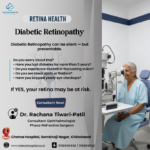In today’s world, more people are looking for ways to get rid of glasses and contact lenses for good. While LASIK has long been a popular choice, not everyone is eligible for it—especially those with high power or thin corneas. For such patients, ICL (Implantable Collamer Lens) surgery is a safe and advanced alternative that offers clear, lasting vision without reshaping the cornea.
Let’s understand who is eligible for ICL surgery and how safe this modern procedure really is.
👁️ What Is ICL Surgery?
ICL stands for Implantable Collamer Lens. It’s a type of lens implant that is placed inside the eye to correct refractive errors like myopia (nearsightedness) and astigmatism.
Unlike LASIK, which involves reshaping the cornea with a laser, ICL surgery involves inserting a thin, flexible lens between your iris (the colored part of the eye) and your natural lens. This lens works with your eye’s natural focusing system to give you crystal-clear vision.
The best part? It’s reversible. The lens can be removed or replaced if required in the future, making it a safe and flexible option.
🎯 Who Is Eligible for ICL Surgery?
Not everyone is a suitable candidate for ICL surgery. Your ophthalmologist will conduct a detailed eye evaluation to determine if this procedure is right for you.
Below are the key eligibility criteria:
✅ 1. Age Group
ICL surgery is ideal for people between 21 and 45 years old.
This ensures that your eye power has stabilized and your prescription is not changing frequently. Younger patients may still experience fluctuations in vision, which can affect results.
✅ 2. Stable Eye Power
Your eye prescription should remain stable for at least one year before surgery.
If your power is changing every few months, your doctor may recommend waiting until it stabilizes for long-term accuracy.
✅ 3. Degree of Myopia
ICL is best suited for those with moderate to high myopia, typically between -3.00D and -20.00D.
It is especially beneficial for patients who have very high eye power that cannot be corrected with LASIK safely.
✅ 4. Corneal Thickness
If your cornea is thin or irregular, LASIK may not be an option.
Since ICL surgery does not involve corneal cutting or reshaping, it is a perfect choice for such patients. The structure of your eye remains natural and untouched.
✅ 5. Astigmatism
ICL can also correct mild to moderate astigmatism, improving both distance and clarity of vision.
✅ 6. Adequate Anterior Chamber Depth
Before surgery, your doctor will check the anterior chamber depth—the space between the cornea and the lens.
This ensures there’s enough room to safely place the ICL lens without affecting other eye structures.
✅ 7. Good Eye Health
You must have healthy eyes, free from conditions like:
- Glaucoma (high eye pressure)
- Cataract (lens opacity)
- Keratoconus (corneal thinning)
- Uveitis (eye inflammation)
- Retinal diseases or detachment
Any existing eye disease should be treated before considering ICL surgery.
✅ 8. General Health
Patients should not have uncontrolled diabetes, autoimmune disorders, or severe allergies, as these may interfere with healing and recovery.
✅ 9. Pregnancy or Breastfeeding
Hormonal changes during pregnancy or breastfeeding can temporarily alter vision.
Hence, it’s recommended to wait at least six months after delivery before undergoing ICL surgery.
✅ 10. Realistic Expectations
ICL surgery provides excellent, long-lasting vision improvement. However, patients should understand that:
- Regular follow-ups are necessary.
- Mild dryness or sensitivity may occur initially.
- Reading glasses may still be needed after age 40 due to natural aging (presbyopia).
🛡️ How Safe Is ICL Surgery?
ICL surgery has been performed globally for over two decades and has an excellent safety record. Millions of people worldwide have benefitted from this procedure.
Here’s why it’s considered one of the safest and most advanced vision correction options:
✅ 1. No Corneal Tissue Removal
Unlike LASIK, ICL doesn’t reshape or thin your cornea.
This means your natural corneal structure remains untouched, maintaining its strength and stability.
✅ 2. Reversible Procedure
The ICL lens can be removed or replaced if needed.
This makes it safer for long-term eye health, giving flexibility for future vision needs or cataract surgery.
✅ 3. Quick and Painless
The surgery takes 15–20 minutes per eye, done under local anesthesia (eye drops).
Most patients experience clear vision within 24 hours and return to normal activities in a couple of days.
✅ 4. UV Protection
ICL lenses are made from Collamer material, which naturally blocks harmful UV rays, offering additional protection to your retina and overall eye health.
✅ 5. High Visual Quality
Patients often report sharper and clearer vision than with glasses or contact lenses.
The optical quality of the implanted lens provides excellent contrast and color perception.
✅ 6. Minimal Risk of Dry Eyes
LASIK can cause temporary dryness due to nerve disruption in the cornea.
Since ICL doesn’t involve corneal cutting, dry eye symptoms are rare after surgery.
⚠️ Possible Risks (Though Rare)
As with any eye procedure, ICL surgery has some rare risks such as:
- Slight increase in intraocular pressure (IOP)
- Infection or inflammation
- Lens misplacement, which can be corrected
- Night glare or halos in a few cases
These risks are minimized when performed by an experienced ophthalmic surgeon and with proper post-operative care.
💡 Aftercare and Follow-Up
After surgery, you will need to:
- Use prescribed eye drops for 2–3 weeks
- Avoid touching or rubbing your eyes
- Wear sunglasses outdoors
- Attend all follow-up visits for IOP and lens position checks
Most patients resume their normal routine within 2–3 days, and vision stabilizes in a week.
🌟 Benefits of ICL Surgery
- Sharp, clear vision without glasses or contacts
- Safe and reversible procedure
- Quick recovery and long-term results
- Suitable for high myopia and thin corneas
- Excellent night and contrast vision
👩⚕️ Expert Care at Chetna Hospital
At Chetna Hospital, Chinchwad, Dr. Rachana Tiwari Patil, Ophthalmologist & Phaco-Refractive Surgeon, specializes in advanced eye procedures including ICL Surgery, Phacoemulsification, and LASER treatments.
With extensive experience and modern diagnostic technology, she ensures personalized, precise, and safe vision correction for every patient.
✨ In Conclusion
If you’ve been told you’re not suitable for LASIK or you have a high eye power, ICL surgery might be the right solution for you.
It’s safe, effective, and delivers long-lasting visual clarity with minimal downtime.
Schedule a consultation today at Chetna Hospital, Chinchwad to know if you are a good candidate for ICL surgery and take the first step toward a clearer, spectacle-free life!













